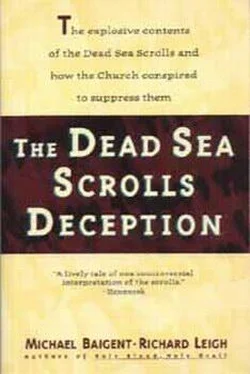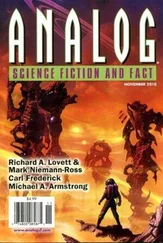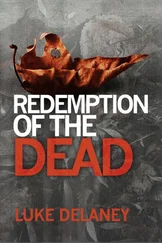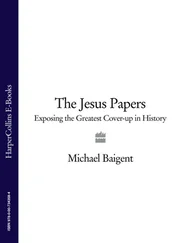Independent scholars from Britain, the States and elsewhere have thus found it impossible to get access to unpublished scroll material. For Israeli scholars, such access has been inconceivable. As we have noted, Father de Vaux, a former member of the notorious Action Franchise, was a fairly outspoken anti-Semite. To this day, members of the Ecole Biblique seem to remain hostile to Israel, even though it is supposed in theory to be a neutral enclave for impartial scholarship, a refuge from the political and religious divisions rending modern-day Jerusalem. When asked why no scholars from Tel Aviv University were involved in editing the scrolls, Strugnell replied: ‘We are looking for quality in Qumran studies, and you don’t get it there.’ 25With his characteristic, and self-incriminating, eloquence, the late Father Skehan effectively articulated his and his colleagues’ anti-Israeli bias in a letter quoted in Jerusalem Post Magazine:
I feel obliged to tell you… that I should not under any circumstances grant through any Israeli functionary, any permission to dispense, for any purpose, or to any extent, of anything whatsoever that is lawfully housed in the Palestine Archaeological Museum. I regard the State of Israel and all of its personnel as having no legal standing whatsoever with respect to the Museum and its contents. 26
As we have noted, this attitude is shared by the former Father Milik. Neither he nor another of his colleagues, the late Father Starcky, ever returned to Jerusalem after the 1967 war, when the scrolls passed into Israeli hands. Then again, of course, their position only echoes that of the Vatican itself, which, even today, does not recognise the State of Israel. But one is prompted to ask whether their prejudice simply coincided with official Church policy, or whether it was formally dictated by the ecclesiastical hierarchy.
As an antidote to the spreading ‘infection’ of Modernism, Pope Leo XIII, in 1902, had created the Pontifical Biblical Commission to supervise and monitor the progress (or lack thereof) of Catholic scriptural scholarship. It consisted originally of a dozen or more cardinals appointed by the Pope and a number of ‘consultants’, all deemed to be experts in their fields of research and study. According to the New Catholic Encyclopaedia, the Commission’s official function was (and still is) ‘to strive… with all possible care that God’s words… will be shielded not only from every breath of error but even from every rash opinion’. 1The Commission would further undertake to ensure that scholars ‘endeavour to safeguard the authority of the scriptures and to promote their right interpretation’. 2
As we have noted, Father Lagrange, founder of the Ecole Biblique, was one of the earliest members of the Pontifical Biblical Commission. The Ecole Biblique’s journal, Revue biblique, was also, until 1908, the Commission’s official organ. Given the close affiliation between the two institutions, it is clear that the original Ecole Biblique was an adjunct of the Commission’s propaganda machine — an instrument for promulgating Catholic doctrine under the guise of historical and archaeological research, or for enforcing the adherence of historical and archaeological research to the tenets of Catholic doctrine.
One might expect this situation to have changed during the last half-century, and especially in the years since the Second Vatican Council of the early 1960s. In fact, it has not. The Ecole Biblique today retains as close an association with the Pontifical Biblical Commission as it did in the past. Degrees at the Ecole, for example, are conferred specifically by the Commission. Most graduates of the Ecole are placed by the Commission as professors in seminaries and other Catholic institutions. Of the Commission’s nineteen official ‘consultants’ today, a number are influential in determining what the general public learns of the Dead Sea Scrolls. Thus, for instance, Father Jean-Luc Vesco, the current head of the Ecole Biblique and a member of the Revue biblique’s editorial board, is also a member of the Pontifical Biblical Commission. So, too, is at least one other member of the journal’s editorial board, Jose Loza. So, too, is a prominent writer on the scrolls, a Jesuit named Joseph Fitzmyer, who has compiled the official concordance for much of the Qumran material. 3
In 1956, the name of Father Roland de Vaux, Director of the Ecole Biblique, appeared for the first time on the list of the Commission’s ‘consultants’. 4He would have been appointed the year before, in 1955, and he continued as a ‘consultant’ until his death in 1971. The timing of de Vaux’s appointment is interesting. In 1955, it must be remembered, much of the crucial and controversial ‘sectarian’ material from Cave 4 was still being purchased and collated. In December of that year, indeed, the Vatican laid out money for a number of important fragments. In 1955, too, the ‘Copper Scroll’ was unrolled in Manchester, under John Allegro’s auspices, and Allegro himself was beginning to go public in a potentially embarrassing fashion. The Vatican thus became aware, for the first time, of the kind of problems it might have to face in connection with the Qumran material then coming to light. The ecclesiastical hierarchy almost certainly felt the need of some sort of ‘chain of command’, or, at least, ‘chain of accountability’, whereby some measure of control could be exercised over Qumran scholarship. In any case, it is significant, if not particularly surprising, that from 1956 on, every director of the Ecole Biblique has also been a member of the Pontifical Biblical Commission. When de Vaux died in 1971, the Commission’s list of ‘consultants’ was updated to include the name of his successor at the Ecole, Father Pierre Benoit. 5When Benoit died in 1987, the new director, Jean-Luc Vesco, became a ‘consultant’ to the Commission in turn. 6
Even today, the Pontifical Biblical Commission continues to supervise and monitor all biblical studies conducted under the auspices of the Catholic Church. It also publishes official decrees on ‘the right way to teach… scripture’. 7In 1907, adherence to these decrees was made obligatory by Pope Pius X. Thus, for example, the Commission ‘established’, by decree, that Moses was the literal author of the Pentateuch. In 1909, a similar decree affirmed the literal and historical accuracy of the first three chapters of Genesis. More recently, on 21 April 1964, the Commission issued a decree governing biblical scholarship in general and, more specifically, the ‘historical truth of the Gospels’. The decree was quite unequivocal, stating that ‘at all times the interpreter must cherish a spirit of ready obedience to the Church’s teaching authority’. 8It further declared that those in charge of any ‘biblical associations’ are obliged to ‘observe inviolably the laws already laid down by the Pontifical Biblical Commission’. 9Any scholar working under the Commission’s aegis — and this, of course, includes those at the Ecole Biblique — is thus in effect constrained by the Commission’s decrees. Whatever conclusions he might reach, whatever the revelations to which his research might lead him, he must not, in his writing or his teaching, contradict the Commission’s doctrinal authority.
The head of the Pontifical Biblical Commission today is Cardinal Joseph Ratzinger. Cardinal Ratzinger is also head of another Catholic institution, the Congregation for the Doctrine of the Faith. This designation is fairly new, dating from 1965, and probably unfamiliar to most laymen; but the institution itself is one of long-established pedigree. It has, in fact, a unique and resonant history behind it, extending back to the 13th century. In 1542, it had become known officially as the Holy Office. Prior to that, it was called the Holy Inquisition. Cardinal Ratzinger is, in effect, the Church’s modern-day Grand Inquisitor.
Читать дальше












